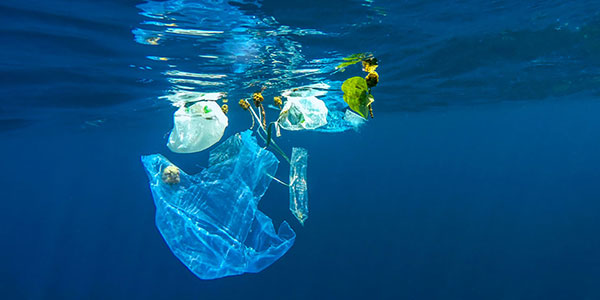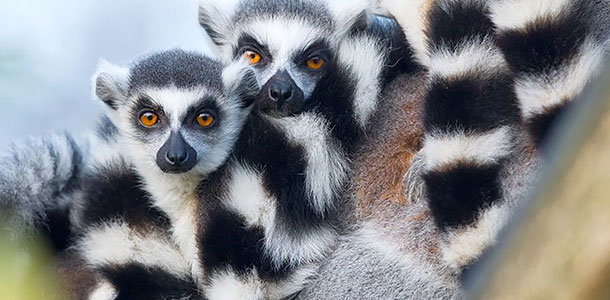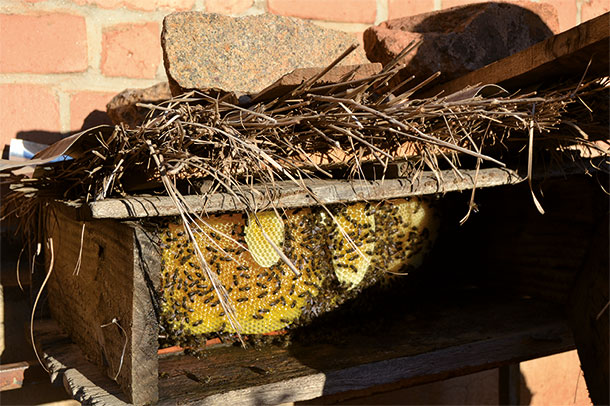Actions on biodiversity
- Commitment #8 -

Focus 2023
Salmon return to the Allier
Historically based in the Auvergne Rhône-Alpes region, CEPOVETT wants to make its contribution to maintaining biodiversity in the area. In particular, the company supports the project to reintroduce salmon into the Allier river.
In recent years, the topographical modification of the river and the construction of a 20-meter-high electric dam had hampered the reproduction of this endemic species. In order to preserve the Loire-Allier strain of Atlantic salmon - the last in Europe to be able to travel thousands of kilometers to the ocean - the local authorities, EDF and environmental associations have joined forces and, in 2019, have launched an 18 million euro project to rebuild a tailor-made dam to facilitate the passage of these migratory fish. As salmon are an indicator of water quality, this major project is part of CEPOVETT's overall commitment to protecting rivers, the ocean and life itself.

Focus 2022
Protection of the oceans
As a major player in the textile industry, CEPOVETT is committed to actively fight for the protection of water resources, oceans and marine biodiversity.
This often "invisible" pollution will persist in the oceans for decades. Nearly 500,000 tonnes of microfibres a year end up in washing machine drains, some of them ending up in the sea. These microfibers and micro-plastics are particularly dangerous for small marine organisms, which mistake them for food. In 2018, the "seventh continent" of plastic - an immense vortex halfway between Hawaii and California, 80% of which is made up of plastics from land - occupied 3.5 million km2 in the Pacific Ocean, or 750,000 pieces of debris per km2. In total, at least 1,800 billion pieces of plastic waste are polluting the oceans and affecting 267 marine species. All the more reason for CEPOVETT to lead the fight for a more environmentally-friendly textile industry.

Focus 2021
Madagascar, a biodiversity hotspot
Madagascar is one of the world's 10 biodiversity hotspots. Home to over 250,000 species, 70% of which are endemic, the island is home to 294 species of birds and 247 species of amphibians.
Its gigantic baobabs (7 species of which can be found on the island), its exceptional primates - such as lemurs - and its cultural heritage make Madagascar a territory of rich and unique biodiversity, where extraordinary flora and fauna have flourished for millennia. Its tropical rainforests (in the east of the country) and dry forests (in the south and west) are home to exceptional ecosystems, but years of deforestation have undermined their biotope. All the more reason to preserve these areas and embark on a reforestation program. Protecting biodiversity plays an essential role in the fight against climate change. Ecosystems are important carbon sinks, enabling living organisms to adapt to the impacts of climate change.

Focus 2020
An experimental apiary in Madagascar
In 15 years, 30% of bee colonies have disappeared. To stem this tide, CEPOVETT-EPSILON has started beekeeping production in Madagascar. The production site has 13 Malagasy hives and 11 modern hives, including two highly sophisticated Australian models. This new hive model features a transparent wall enabling the level of honey in the hive to be checked without opening it. Pre-formed transparent plastic cells installed on the frames are fitted with a tap and can be opened in two to allow harvesting. Once the bees have done their bit, all that's left to do is open a tap and the honey flows out. This new "FLOW-HIVE" method is gentler and safer for the bees, avoiding stress or crushing. With the 4 frames the employees recovered, they were able to fill 17 small jars with honey.
Focus 2019
CEPOVETT Group contributes to the fight against the Varroa mite
Varroa destructor, the parasitic bee mite, is an endemic disease that strikes our hives and decimates our bees. An experimental solution is to select Varroa-resistant bees, known as VSH bees for "Varroa Senstivie Hygienic". The idea of beekeeper Didier Brick and around forty volunteer beekeepers in Belgium, is to create queens carrying this VSH trait. Initiated in 2015 in the Benelux countries, this project has inspired CEPOVETT Group, which will be conducting genetic selection trials on a dozen VSH-carrier queens in spring 2019. This initiative underlines the company's commitment to safeguarding biodiversity and protecting bees.
Focus 2018
CEPOVETT Group Bee Compatible biodiversity program
In July 2016, 40 years after its big sister the "Nature Protection Act", the law for the reconquest of biodiversity, nature and landscapes was finally adopted by the National Assembly. Providing a home for bees is one of CEPOVETT Group's major biodiversity projects launched in 2013. The "Bee compatible" project involves installing beehives on the company's various sites to raise awareness of the disappearance of this pollinating insect around the world.
In 2017, from the rooftops of Paris to Madagascar, corporate honey is still in the spotlight at CEPOVETT Group. Several apiary visits and honey tastings were organized at the various Villefranche and Paris sites. An approach that is as original as it is environmental, and which has won over stakeholders. In 2018, a new initiative combines art and biodiversity, through urban beehives decorated by a collective of artists and personalized.
Focus 2017
2017 Report
In July 2016, 40 years after its big sister the "Nature Protection Act", the law for the reconquest of biodiversity, nature and landscapes was finally adopted by the National Assembly. Providing a home for bees is one of CEPOVETT Group's major biodiversity projects launched in 2013. The "Bee'compatible" project involves installing beehives on the company's various sites to raise awareness of the disappearance of this pollinating insect around the world. In 2016, the experiment was extended with the implementation of a traditional apiary in Madagascar, the company's production site. The island is one of the 10 "hot spots" of biological diversity, so CEPOVETT Group decided to make its contribution to safeguarding local biodiversity by installing beehives near its reforestation zones. Several types of hive have been tested in the experimental apiary, combining the traditional (Kenyan hive) and the modern (Flow Hive), an automatic hive with a tap that allows honey to be collected without opening the hive. All the company's sites actively involve their employees in this genuine sustainable development initiative in favor of biodiversity. Nearly fifty customers have already been able to visit the company's various apiaries and taste CEPOVETT Group honey potted by the employees themselves. An original way of understanding and sharing the challenges of biodiversity with our stakeholders.
Focus 2016
A biodiversity program led by employees
CEPOVETT Group has made the bee a lever for mobilizing its employees in favor of biodiversity. Based on the observation that the pollinating insect is more at home in towns than in the countryside, CEPOVETT Group has installed several apiaries on its sites in France and abroad, including Paris. Managing the apiary unites all employees, from senior management to staff, around a meaningful project that culminates in the annual honey harvest. The company honey is then packaged by employees in jars bearing the company's image. In 2015, CEPOVETT Group invited its stakeholders to visit the apiaries to raise awareness of the importance of safeguarding bees for the preservation of biodiversity. These visits are convivial moments of exchange during which employees can pass on their knowledge and have the product of their harvest tasted. A jar of honey is offered to each participant as a symbolic gesture of this commitment.
